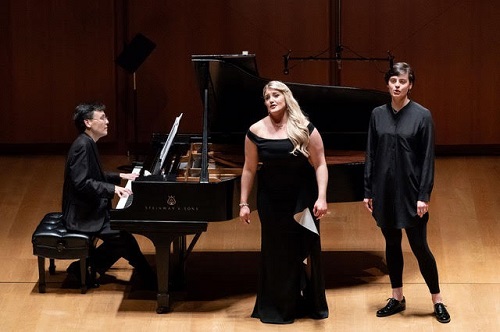 United States Various Composers: Julie Adams (soprano), Emily D’Angelo (mezzo-soprano), David Chan (violin), Ken Noda (piano), Glider Lehrman Hall, The Morgan Library & Museum, New York, 5.5.2019. (RP)
United States Various Composers: Julie Adams (soprano), Emily D’Angelo (mezzo-soprano), David Chan (violin), Ken Noda (piano), Glider Lehrman Hall, The Morgan Library & Museum, New York, 5.5.2019. (RP)

Debussy – Allegro vivo (Sonata in G minor)
Copland – ‘Why Do They shut me out of heaven?’, ‘The world feels dusty’, ‘Heart, we will forget
him’, ‘I’ve heard an organ talk sometimes’ (Twelve Poems of Emily Dickinson)
Wagner – Elsa’s Dream (Lohengrin)
Rebecca Clarke – ‘The Seal Man’
Clara Schumann – ‘Die Lorelei’
Strauss – ‘Morgen’ Op.27 No.4, ‘Beim Schlafengehen’ (Four Last Songs), ‘Sein wir wieder gut’ (Ariadne auf Naxos)
Schoenberg – ‘Erwartung’, ‘Schenk mir deinen goldenen Kamm’ (Four Songs Op.2 Nos.1&2)
Berg – ‘Traumgekrönt’, ‘Sommertage’ (Seven Early Songs Nos.4&7)
Massenet – Meditation (Thaïs)
Rachmaninoff – ‘Ne poy, Krasavitsa’ (Six Romances Op.4 No.4), ‘Son’ (Six Romances Op.38
No.4)
Grieg – ‘Zur Rosenzeit’ Op.48 No.5, ‘Ein Traum’ Op.48 No.6
Soprano Julie Adams and mezzo-soprano Emily D’Angelo have each been winners at two of the most prestigious voice competitions in the US, the Metropolitan Opera National Council Auditions and the George London Awards. As they begin their careers, they are making their mark with roles appropriate to where they are as singers and artists here and now. This recital, however, revealed their aspirations. And what better place to do so than under the auspices of the London Foundation and before the most supportive of audiences?
I last heard D’Angelo singing a delightful Rosina in The Barber of Seville at the 2018 Glimmerglass Festival. Undoubtedly more lie in her future, as well as other Rossini and Mozart roles for which she seems ideally suited. Her singing here, however, displayed an edgier side to her personality and revealed her voice to be far darker and richer than I had imagined.
D’Angelo opened with four selections from Copland’s Twelve Poems of Emily Dickinson, bringing a bold urgency to them, especially her defiant challenges in ‘Why do they shut me out of heaven?’ I favor a more tender, wistful approach to ‘Heart, we will forget him’, but D’Angelo’s passion was ever evident. Later, there was a fascinating pairing of two ballads that relate tragic tales ending in watery deaths, Rebecca Clarke’s chilling ‘The Seal Man’ and Clara Schumann’s ‘Die Lorelei’, songs that displayed her dramatic flair and keen narrative skills.
The songs of Schoenberg and Berg, composed when they were still under the sway of Wagner and post-Romanticism, found D’Angelo at her most lyrical and romantic. Especially winning were ‘Traumgekrönt’ and ‘Sommertage’ in which she radiated joy singing of the intertwined wonders of love and nature. She concluded the concert with the Composer’s Aria from Ariadne auf Naxos, infusing Strauss’s paean to art with ecstasy and radiant sound.
At the intermission, people were musing whether Brünnhilde was in Adams’s future after hearing her sing Elsa’s Dream from Lohengrin. I doubt if Adams will be popping out ‘Hojotoho!’ on the opera stage anytime soon, but with her gleaming, full-bodied voice and her grand yet sensuous style, it’s easy to see why such hopes took flight.
Who can resist the stunning beauty of the introduction to Strauss’s Morgen when played by David Chan, the Metropolitan Opera Orchestra’s concertmaster? To me, the addition of the violin diminishes the intimacy of the song, but Strauss himself did the arrangement. In ‘Beim Schlafengehen’ from Four Last Songs, Chan again played the violin solo. It was a magical moment when Adams took over the sublime melody with her shimmering soprano.
The Rachmaninoff and Grieg songs suited Adams to a tee. In Rachmaninoff’s ‘Ne poy, Krasavitsa’, an exile’s lament over a distant homeland and a forsaken love, she summoned the full splendor of her voice. Her soprano was gorgeous over its entire range in Greig’s ‘Ein Traum’, culminating in a glorious climax when she sang of the moment when the poet realizes that his dream of joy and love is a reality.
For an encore, they performed the Barcarolle from Offenbach’s The Tales of Hoffmann.
Chan began the concert with the Allegro vivo from Debussy’s Sonata in G minor for Violin and Piano and the Meditation from Thaïs. Completed in April 1917, the sonata was Debussy’s final work, composed when he was dying of cancer and subject to the deprivations of war. Chan and Noda captured the dreaminess of this subtle, delicate work. In the second half, a collective sigh could be felt, if not actually heard, as the final notes of the Massenet faded away.
Noda’s profound knowledge of the repertoire and consummate musicianship were on full display, and he played everything with a masterful touch. The highlights were the rich colorings and full-bodied tone that he brought to the Wagner, the swirling, feverish accompaniment of Schumann’s ‘Die Lorelei’ and the lyricism and drama that he instilled in the Rachmaninoff songs.
On display outside the auditorium was Strauss’s autographed manuscript of Morgen (sans violin) dating from 1894, which is in the Morgan Library’s collection. Nora London stopped to look while I was inspecting it. I commented how fortuitous it was that it was being exhibited in conjunction with the recital. Irrepressible and indomitable as always, she responded that it was her idea, adding with a twinkle in her eye ‘I’m rather pushy’. Undoubtedly, it only took a gentle nudge for the Morgan to display such a treasure.
Rick Perdian